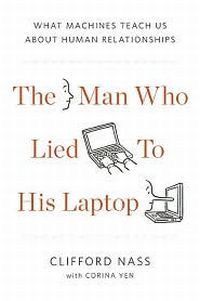

Purchase
The Man Who Lied To His Laptop
Clifford Nass
What Machines Teach Us about Human Relationships
Penguin
September 2010
On Sale: September 2, 2010
256 pages
ISBN: 1617230014
EAN: 9781617230011
Hardcover
Add to Wish List
Non-Fiction
Counterintuitive insights about building successful
relationships-based on research into human-computer interaction. The driver was insistent: "A woman should not be giving
directions." Despite the customer service rep's reassurance
that the navigation system in his car wasn't actually a
woman-just a computer with a female voice-the driver (and
many others like him) refused to listen. There was only one
person for BMW to call for help: Clifford Nass, one of the
world's leading experts on how people interact with technology. After two decades of studying problems like BMW's GPS
system, Microsoft's Clippy (the most reviled animated
character of all time), and online evaluations that lead
people to lie to their laptops, Nass has developed a
powerful theory: Our brains can't fundamentally distinguish
between interacting with people and interacting with
devices. We will "protect" a computer's feelings, feel
flattered by a brown-nosing piece of software, and even do
favors for technology that has been "nice" to us. All
without even realizing it. In his research at Stanford, Nass has leveraged our
fundamentally social relationship with computers to develop
and test a series of essential rules for effective human
relationships. He has found that the most powerful
strategies for working with people aren't really that
complicated, and can be learned from watching what succeeds
and fails in technology interfaces. In other words, if a
computer can make friends, build teams, and calm powerful
emotions, so can any of us.
Comments
No comments posted.
Registered users may leave comments.
Log in or register now!
| 


 © 2003-2025 off-the-edge.net
all rights reserved Privacy Policy
© 2003-2025 off-the-edge.net
all rights reserved Privacy Policy